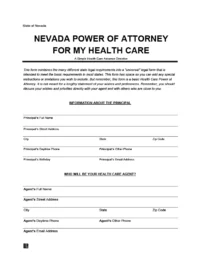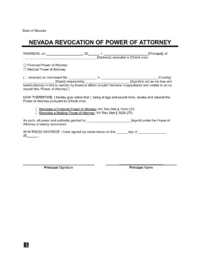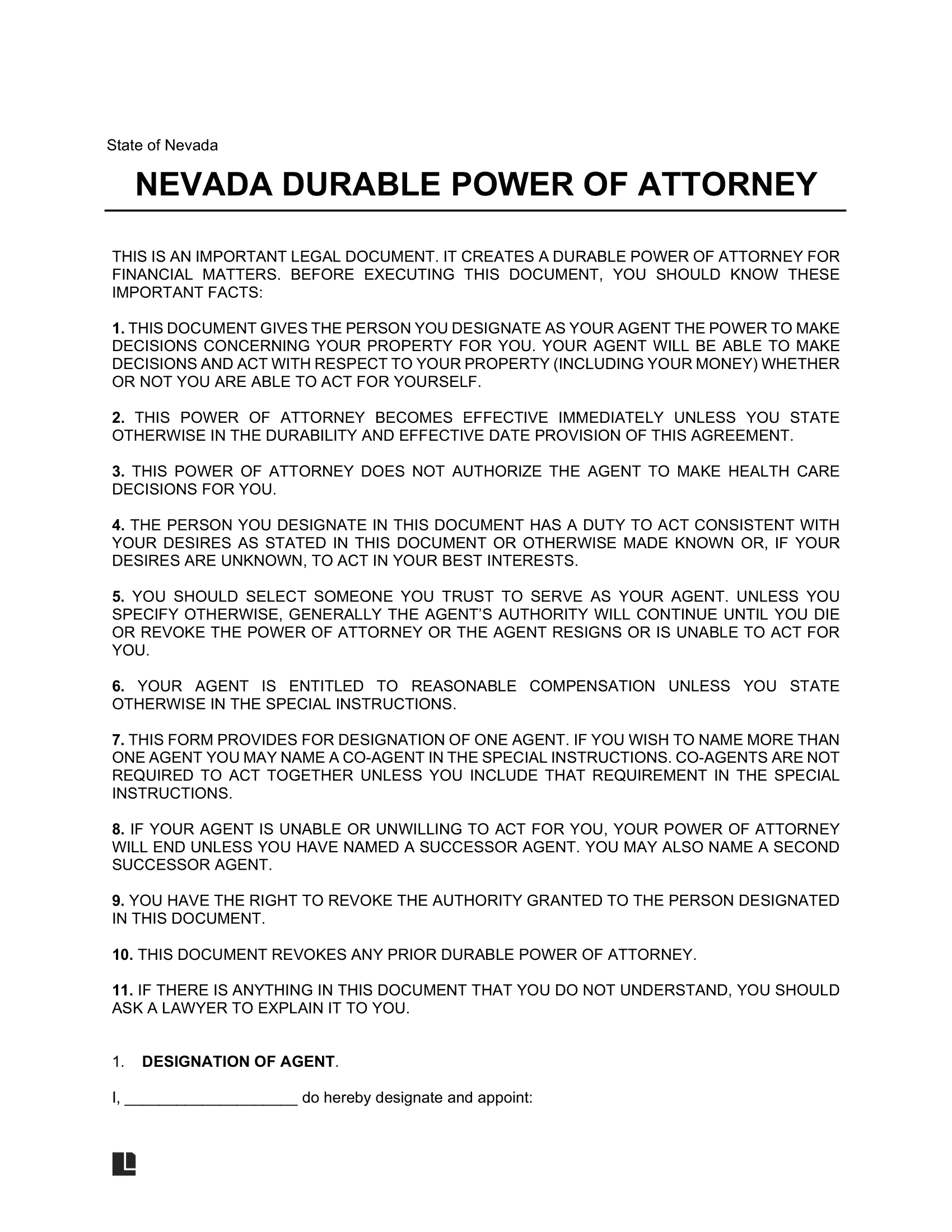A Nevada durable power of attorney is a legal document that allows an individual (also known as “the principal “) to appoint someone else (“an agent”) to manage financial matters. The agent must act on behalf and in the principal’s best interest, and their power remains in effect even if the principal becomes incapacitated.
This form is generally used for financial and business matters.
Laws
In Nevada, power of attorney forms are durable by default.
- Relevant Laws: Chapter 162A (POWER OF ATTORNEY FOR FINANCIAL MATTERS AND DURABLE POWER OF ATTORNEY FOR HEALTH CARE DECISIONS)
- Presumed Durable: Yes. § 162A.210
- Signing: A signature is required.
- Notarization: A durable power of attorney is not required to be notarized in Nevada, but the principal’s signature will be validated if acknowledged by a notary public. § 162A.220
- Statutory Form: Yes — § 162A.620
Definitions
Durable – “Durable,” with respect to a power of attorney, means not terminated by the principal’s incapacity (§ 162A.040)
Power of Attorney – “Power of attorney” means a writing or other record that grants authority to an agent to act in the place of the principal, whether or not the term “power of attorney” is used (§ 162A.090).
Specific Powers and Limitations
Restrictions on Gifts and Transfers
Types of Gifts:
- Gift “for the benefit of” an individual: This type encompasses contributions made by an agent to a trust, deposits into accounts under the Uniform Transfers to Minors Act (NRS 167.090), investments in prepaid tuition plans (NRS 353B.10), and contributions to 529 education savings accounts, aligning with (NRS 353B.340).
- Outright gifts to individuals: An agent is authorized to make outright gifts of the principal’s property, adhering to the annual dollar limits set by the federal gift tax exclusion. This includes making gifts for a person’s benefit without direct transfers, in compliance with state guidelines on gift transfers and tax exclusions (NRS 162A.610).
- Consent to split gifts: An agent may consent to the splitting of gifts made by the principal’s spouse, effectively doubling the allowable exclusion limit per donee by combining the annual gift tax exclusions of both spouses, as per IRC Section 2513.
Considerations:
- Historical gift-making patterns of the principal.
- Eligibility for assistance programs or benefits under Nevada regulations.
- Strategies for minimizing various taxes, in accordance with Nevada tax laws.
- Evaluation of the principal’s property and future financial needs, under the guidance of Nevada statutes on property and fiduciary duties.
- Restrictions imposed on agents, particularly regarding self-benefiting transactions, unless explicitly allowed.
Agent’s Authority Limitations
NRS 162A.620 stipulates that unless it is specifically stated otherwise, agents who are not the principal’s spouse, ancestor, or descendant are generally restricted from exercising authority to their own benefit.
Specific powers involve important decisions about your property and how it’s handled both during your lifetime and after your passing. To grant any of these powers, you’ll need to explicitly give your permission by initialing next to the specific authority you’re comfortable with your agent having; otherwise, the agent is limited from exercising these powers.
Here’s a quick breakdown of the powers you can choose to grant:
- Trusts: The power to start, change, or end different types of trusts, such as living trusts or family trusts.
- Gifts: The ability to give gifts, but within certain rules and any instructions you’ve set.
- Survivorship Rights: The option to establish or modify who inherits property automatically upon your death.
- Beneficiary Designations: Changing who benefits from your insurance policies, retirement accounts, etc.
- Joint and Survivor Annuity Rights: The choice to give up your right to benefit from certain retirement plans or to designate that right to a loved one.
- Fiduciary Powers: Allowing your agent to handle duties you’re responsible for, like managing a trust or estate.
- Refusing Property: The capacity to turn down property or appointments given to you, potentially to adjust how your estate is distributed.
Revocation and Termination
According to NRS 162A.820, the ability to act under a Durable Power of Attorney ends if:
- An alternate agent is appointed.
- The person who gave you this power takes it back.
- You can no longer do it because of death, resignation, or incapacity.
- The person who gave you the power dies.
Safekeeping and Registration
In Nevada, there isn’t a statewide registry for DPOAs, but the law may require the registration of documents related to real estate with the county recorder’s office.
Additional Resources
- Nevada Legal Services: Offers specific information and assistance on durable powers of attorney, reflecting Nevada’s commitment to providing legal support to its residents.
- State Bar of Nevada: Provides links to resources, including free and low-cost legal services, catering to individuals in need of guidance on durable powers of attorney and other legal matters.
Related Forms
Medical Power of Attorney
Signing Requirements: Two witnesses or a notary public. (§ 162A.790).
Revocation of Power of Attorney
Signing Requirements: Notary public (§ 162A.220(1)).
Minor (Child) Power of Attorney
Signing Requirements: Notary public.



